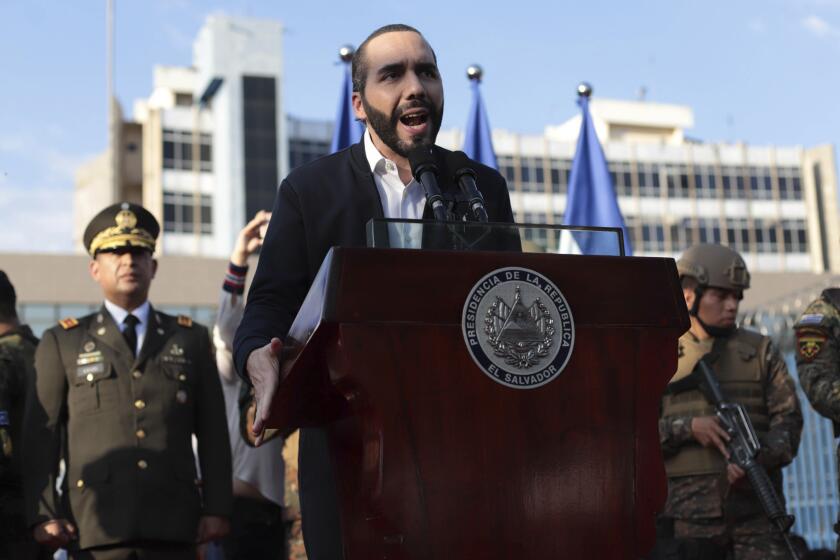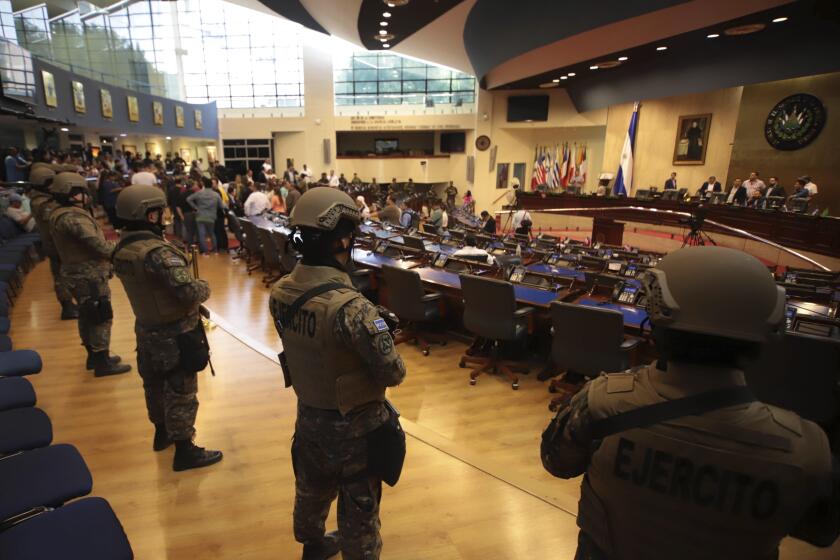El Salvador’s president appears to win control of congress

- Share via
SAN SALVADOR — President Nayib Bukele appeared Monday to have won control of El Salvador’s unicameral congress, ending a two-year standoff with legislators of the old parties that have dominated politics in the Central American nation since the end of its 1980-1992 civil war.
The populist Bukele, 39, celebrated, writing: “Our people have waited 40 years for this.”
A preliminary count of about 80% of the ballots from Sunday’s elections showed Bukele’s New Ideas party and a coalition partner winning several times as many votes as the established political parties, the conservative National Republican Alliance and the leftist Farabundo Marti Liberation Front. Exit polls suggested that Bukele’s party could win 53 of the 84 seats in the Legislative Assembly.
“His victory reflects how much anger most Salvadorans feel towards the country’s two discredited and moribund political parties, which had their chance to govern but failed,” wrote Michael Shifter, president of the Washington-based think tank Inter-American Dialogue.
Bukele has blamed the congress for blocking his efforts in everything from controlling crime to managing the COVID-19 pandemic. But he has also shown an authoritarian streak. Two years ago, he sent heavily armed soldiers to surround the congress building during a standoff over security funding, earning rebukes internationally.
“Although Bukele is a legitimate, democratically [elected] president with solid majority backing, his authoritarian tendencies and weakening of any checks on his power is of great concern,” Shifter wrote. “The story is not unique to El Salvador — democratic elections have yielded antidemocratic leaders and governments, of the right and the left elsewhere in Latin America. Experience tells us that such stories often have unhappy endings.”
The Biden administration turned down a meeting request with El Salvador’s president on an unannounced trip to Washington last week, according to three people with knowledge of the decision.
About 51% of El Salvador’s 5.3 million registered voters turned out for Sunday’s election, which will also decide 262 municipal councils.
“I’ve come to vote for a change, to get rid of the corrupt ones and so our president can make a new country,” said Estela Jiménez, who arrived early at a polling place wearing a T-shirt with an “N” for Nayib.
With a majority in the Legislative Assembly, Bukele’s party would be able not only to advance his agenda but also to name justices to the Supreme Court — another Bukele obstacle — as well as magistrates to the Supreme Electoral Tribunal, the attorney general, the prosecutor for the defense of human rights and others.
Eduardo Escobar, executive director of the non-governmental organization Citizen Action, said that if New Ideas wins a congressional majority, El Salvador would lose “that brake on the exercise of power from the legislature when legality or constitutionality is exceeded, [and] that brakes any attempted abuse, any arbitrary act that the executive wants to commit.”
The U.S. is slashing military aid to El Salvador despite lobbying by the country’s pro-American but, some say, increasingly authoritarian leader.
Although Bukele’s popularity remains at stratospheric levels and rejection of the traditional parties is nearly as fervent, single-party control of so many levers of government “would deepen the authoritarianism of the government Bukele leads,” Escobar said.
New Ideas’ popularity is due to the fact that, “in the 30 years of government under these [traditional] parties, the people have not seen improvements in their lives,” said Escobar.
In statements before polls closed, Bukele upped the stakes by calling on those who hadn’t voted yet to participate in “Operation Remate” — literally, “Operation finish them off.”
“The country has decided to end the postwar era, but there is more to do,” Bukele said. “Let’s make this an overwhelming victory.”
News Alerts
Get breaking news, investigations, analysis and more signature journalism from the Los Angeles Times in your inbox.
You may occasionally receive promotional content from the Los Angeles Times.
Because campaigning is supposed to be suspended just before and on election day, the country’s Supreme Electoral Tribunal said it would open an investigation into Bukele for making political statements Sunday.
The tribunal noted that Bukele is supposed to avoid using his office to influence elections.
More to Read
Sign up for Essential California
The most important California stories and recommendations in your inbox every morning.
You may occasionally receive promotional content from the Los Angeles Times.















